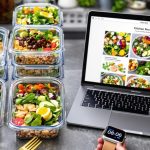
Eating properly and getting regular physical activity are the two essential components of a healthy lifestyle. Can synchronizing our diets and exercise routines enhance our physical fitness outcomes? Do our eating habits need to be different before, during, and after physical activity? If so, what should the differences be?
Combining a high-quality diet with engaging physical activity can be a difficult task. Taking time away from our hectic lives to feed ourselves nutritious meals and fit in the various exercises that suit us is often hard to come by. Eating meals at different points in the day, not focusing on nourishing diet foods, forgoing meals, overindulging, snacking between meals, physical activity sporadically, and being hindered by injuries … life can make it difficult to maintain our “healthy lifestyle intentions.” Although adaptability can be a necessity and a good thing, staying dedicated to a food plan-and-exercise program has impressive benefits.
Consuming meals regularly (5-7 times) throughout the day helps stabilize blood sugar and energy levels while engaging in physical activity on a frequent basis assists in burning up the calories consumed. Timing the intake of food can improve the effects of exercise in achieving desired physical results.
Does Fast-And-Burn Work For Weight Loss?
You may be wondering about the value of planning and timing meals to coincide with exercise, for example, eating breakfast or having a quick snack before working out.
It has been proposed that strenuous exercise like running, swimming, or cycling when one has not eaten can augment fat metabolism and result in weight reduction. However, many experts caution against pre-exercise fasting. Exercising while not having sufficient nourishment may lead to a quicker breakdown of fats, though it won’t be enough to provide the energy necessary for more strenuous workout routines.
Exercising too much can heighten the chance of strains, sprains, stress fractures, and other injuries resulting from being worn out. Additionally, if people exhaust their bodies too much, it could lead to excessive eating afterward, eliminating any advantages they received from exercising.
Consequently, it is better to fuel up before engaging in exercise if you wish to improve your performance. This sustains the body with a consistent flow of energy and a feeling of fullness. Understanding the motivations behind, what to consume, and when to do so can have a tremendous effect on your exercise regimen.
Training And Nutrient Timing Before Events
Having an organized meal plan is essential for getting the most possible benefit out of daily exercises and helping the body to recover quickly, particularly preceding the major event. The meal just before an athletic event such as a race or a big game is highly significant.
Making a wrong choice in what to eat or drink-having overly large portions, not having enough, or not eating at a suitable time-can substantially affect the results. Consuming the perfect meal prior to a race or event can guarantee that your hard work and determination will have a beneficial outcome. Adopting a proper daily sports nourishment routine can bring about optimal outcomes.
What to Eat Pre-Workout
The type of food consumed prior to exercising is critical in certain contexts. The sustenance you consume prior to physical activity will offer your organism an immediate source of energy utilized while exercising. The purpose of nutritional intake prior to exercise is to give you an upsurge of energy without being too full or sleepy. What you should actually eat before training is going to depend on two major factors:
- How much time you have before your training session?
- The type of training you’re doing in the gym.
It is important to include a certain amount of carbohydrates in your pre-exercise meal. Carbs are essential for exercise because they are the primary energy source that your body draws upon for anaerobic tasks like weight lifting. It is essential to provide your body with sufficient carbohydrates so that it is able to withstand the tough exercise session you are about to start.
Protein should be kept at a low to moderate amount prior to exercise because it takes longer to process and is not recommended to be used as energy during the workout. Mentioning that having a small amount of protein prior to exercise may lead to an overall larger net protein balance.
It is essential for a person’s diet to include fats, but prior to exercising, the amount should be limited due to their inability to be processed quickly and their low priority when engaging in certain activities. Consider the time before your workout: it significantly influences what you consume. Make sure to take this into account.
30 Minutes or Less Before
If you have less than a 60-minute window until your exercise session, it is best to eat food with a high amount of carbohydrates that can be digested easily and provide a short-term energy boost to help you through your training. Typically, the best choice in this region will be straightforward, high Glycemic Index (GI) carbohydrates. Some viable examples include:
Bananas
Bananas are a prime source of carbohydrates which are easily digested by almost everyone. They are packed with essential nutrients necessary for learning, such as potassium and vitamin B-6.
Unsweetened Applesauce
Applesauce with no added sugar can be an excellent fast means of obtaining energy from carbohydrates, is easy on the digestive system, and has a pleasant flavor. Applesauce provides an excellent source of potassium, as well as vitamins A and C.
Fruit Smoothie
Preparing a fruit smoothie from scratch can be an efficient and useful way to give your body the energy boost it needs before doing any physical activity. It is important to not burden your body with a smoothie that will cause issues like nausea, bloating, or any other negative effects when you’re working out.
1-2 Hours Before
If you have additional time before engaging in physical activity, the kind of food you should intake should be modified. If you only have an hour or two before your workout, prioritize eating foods that are a great source of quick-digesting carbohydrates and moderate amounts of protein. This will provide you with the energy you need to get started and power through your routine. Now that you have extra time, concentrate on eating more complex carbohydrates and proteins of elevated quality. Some of your options could be:
Protein Oatmeal
Eating oatmeal is an excellent way of getting complex carbohydrates in your diet and can help to improve your digestive system by providing high quantities of soluble fiber. Additionally, it is believed to help lower cholesterol.
The fiber and complex carb content of it provides a steady source of glucose for physical activity. Although it isn’t compulsory, you can include your preferred protein powder in your oatmeal to help achieve your daily protein quota and also make your oats taste better.
If you are running out of protein powder, you can supplement with some peanut butter to increase the amount of protein and add beneficial fats.
Whole Grain Bread Sandwich
Whole grain bread contains an abundance of beneficial nutrients such as carbs, fiber, vitamins, and minerals.
Constructing a sandwich with lean deli cuts and fresh veggies can be a delightful, nutritionally beneficial meal before exercise which fulfills all the requirements of a quality pre-workout dish.
Peanut Butter on a Whole Wheat Bagel
Peanut butter provides healthy fats along with some protein. Whole grain bagels contain a large number of carbohydrates that will provide the energy your body needs to do well in your upcoming exercise session.
3-4 Hours Before
If you’re not going to be exercising for quite a few hours, then you are able to be quite flexible about the food you choose to eat. Keeping your diet diverse by including food from many food groups is the key to staying healthy.
The objective of a meal taken a few hours ahead of time should be to supply your body with the essential nutrients it requires over the course of the day. As long as it contains a majority of these things, the specific foods you ingest are totally up to you:
- Lean Protein Source
- Complex Carbohydrate
- Vegetable
- Fat Source
What to Eat During Your Workout
The significance of what one takes in during a workout differs depending on the kind of exercise they are doing. Generally, if you are not exercising for more than two hours in a row, you probably don’t need to eat anything during your workout.
Most people who enjoy weightlifting find it beneficial. If you do powerlifting or weightlifting, your workout may take longer than two hours. However, a big part of that time spent in the gym is devoted to resting between strenuous sets. Research reveals that a regular strength training session is not likely to use up too much of your muscles’ glycogen, only about 40%.
On the other hand, if you are an athlete who is more focused on endurance or a bodybuilder experiencing extreme weight loss, then it may be wise to take in some nourishment during practice. In such cases, you can try these options during your session:
- A sports drink
- Carbohydrate powders or mixers
- Fruit snacks
You can give your energy boost by simply drinking or eating something without having to do any advance preparation.
What to Eat After Your Workout
The foods you consume after exercising can significantly influence the results you receive in the long run. Once the exercise has been completed, the focus of nourishment needs to be turned towards obtaining protein rather than carbohydrates.
Carbs are still relevant and could be used after exercising to refuel glycogen, but the critical factor is to get your muscles working to their highest potential by consuming a top-notch source of protein.
The optimum situation is to get a source of protein that is full of nutrients and easily digestible. You should try to aim for at least 20 to 40 grams of protein in your meal. Some great protein-packed options post-workout might be:
Chicken and Rice
A four-ounce portion of chicken breast supplies a sizeable quantity of 35 grams of premium protein. Combined with some cooked white or brown rice, as well as some veggies, this makes for a balanced and satisfying post-exercise meal.
Steak and Sweet Potatoes
The amount of protein in steak varies depending on the kind of steak you buy. Eating four to six ounces of a lean cut of steak, paired with a complex carbohydrate like sweet potatoes or vegetables, is the best way to go.
Protein Shake and Fruit
It doesn’t matter if you put both ingredients in a blender or keep them separate, you won’t be disappointed when you mix a good quality whey protein powder with a healthy fruit for a post-workout meal.
Effective Eating Before A Workout
Meals eaten before a workout should be simple to digest but also quick and convenient to consume. An individual should assess their nutrition plan for a pre-workout routine depending on the period and force of the activity, the opportunity to add to it throughout the activity, the person’s energy requirements, climatic conditions, and when it begins.
An individual with a greater body mass running in an extended competition probably requires a bigger meal and extra nutrition throughout the race to hold their energy level up.
Figuring out the right quantity can be difficult, but it is essential that you experiment to see what works. The athlete should try various pre-workout meals while engaging in different levels of training in order to find what works best. If you are preparing for a certain competition, it is recommended to practice under the same conditions (time and environment, etc.) you will have on the day of the event when trialing different nutrition techniques to guarantee the greatest outcomes.
Workout Recovery Basics And Nutrition
In order to build our fitness and strength, we must be prepared for what is to come as soon as our workout finishes. Concentrating on recuperation is essential and widely disregarded regarding correct athletic nourishment.
A nutritional strategy that is successful in restoring health includes the appropriate nutritional elements at the appropriate time. The body’s response to an exerted amount of work and its ability to increase its strength for the following exertion is called recovery. In order for recovery to be effective, it is necessary to consume carbohydrates to refill empty energy resources, proteins to rebuild broken muscle fibers as well as create more, and hydration and electrolytes to rehydrate the body.
A rapid and complete restoration of energy and hydration aids performance in the next activity or competition, raising the chances of achieving goals and lowering the risk of harm. Fast recovery is absolutely necessary during times of strenuous exercise and anytime there are two or more workouts within a 12-hour span.
When To Start Replenishing Carbs After Exercise
Training generally depletes muscle glycogen. In the first 30 minutes after you have been physically active, there are factors at work that can help your body to recover nutritionally, such as an increase in blood flow and enhanced insulin sensitivity. This leads to higher levels of cellular glucose intake and the replenishment of your glycogen stores.
Athletes should eat a snack that contains a lot of carbs within half an hour after exercise to get the full benefit of muscle glycogen replacement. It is suggested to consume 1.0-1.5 g of carbs for every kg of body weight within half an hour of working out for a quick restoration of the glycogen stores.
For a 150-pound athlete, that means consuming between 68 and 102 grams of carbohydrates (or approximately 4.5-6.5 servings of carbohydrates) following a workout. It can be tricky to get the recommended nutrients shortly after physical activity, so liquid and snack bars that are specifically designed to offer refueling assistance can be a handy and easy way to restore your energy.
It is ideal for athletes to take in their carbohydrate load in two-hour intervals over the course of six hours, or transition to carbohydrate snacks and meals if they will be doing another intense workout within the next 24 hours. It may be wise to eat fewer carbs more often if the previous dietary advice results in a sensation of feeling overly full.
Rehydrate Effectively With Fluids And Sodium
Most of the weight lost during physical activity is liquid, therefore using a scale (while not wearing clothes) before and after exercising can help determine the exact liquid loss. Consume 16-24 fluid ounces for each pound of weight lost over a 4-6 hour span to replenish liquids. Have a recovery beverage, sports drink, or H2O to restore hydration.
It is essential to rehydrate prior to the subsequent workout. Consuming food and fluids that incorporate salt in hot and humid weather is much more successful at aiding in rehydration than without it. If you’re working out for a short duration at a relaxed pace, water is the only hydration needed.
Listen To Your Body’s Timing Signals
Although this advice is a great place to get started, there are not any athletics nutrition regulations that are appropriate for everyone…so it is essential to be aware of how you experienced while doing physical activity and how nutrition affects how you perform.
Adjusting your exercise program and diet to achieve a beneficial combination is key to success. Modifying the timing and incorporating unique routines is the way to find what works best for your body. It is essential to be aware of timing when it comes to sports nutrition, and having this properly managed can make a huge positive impact!














